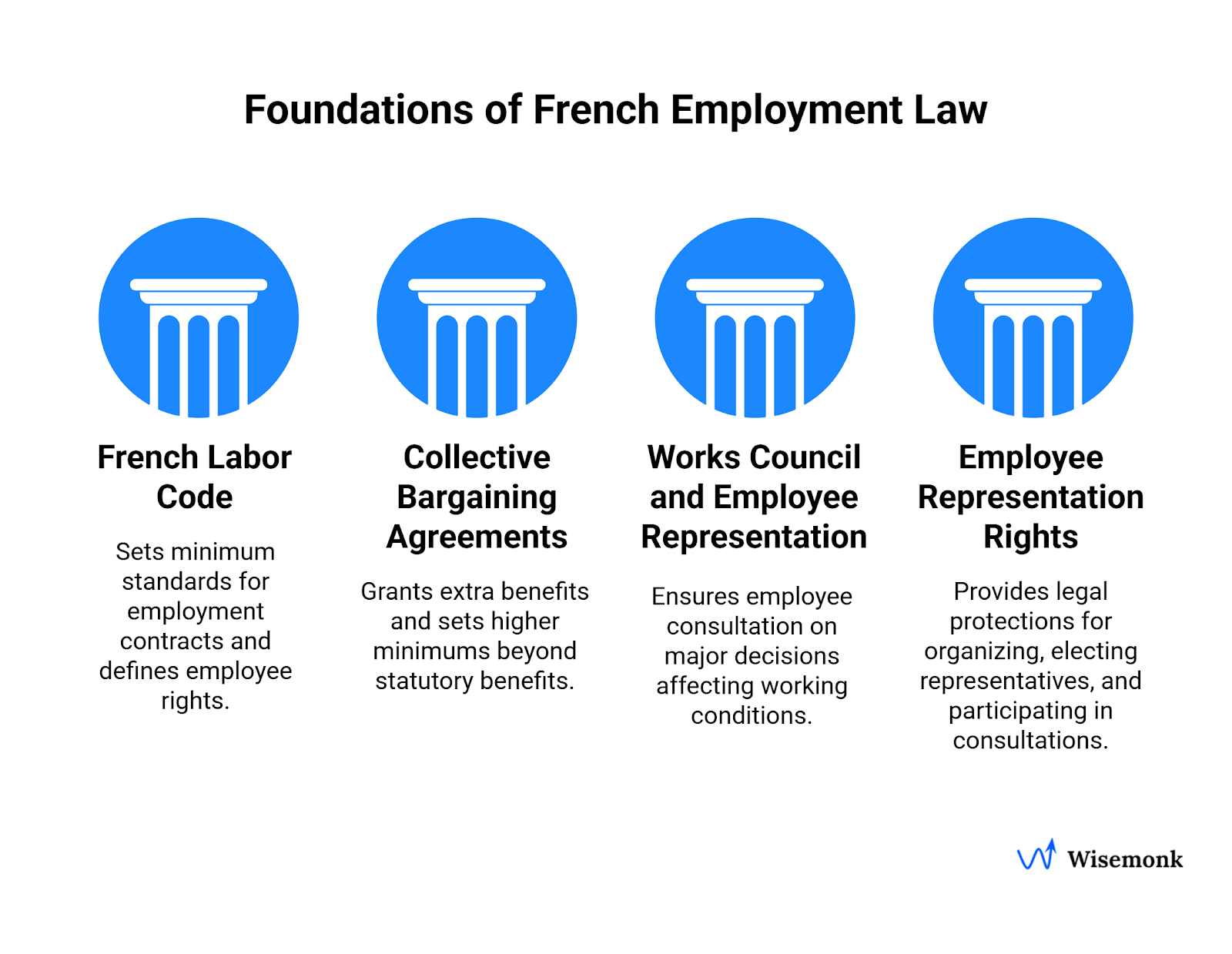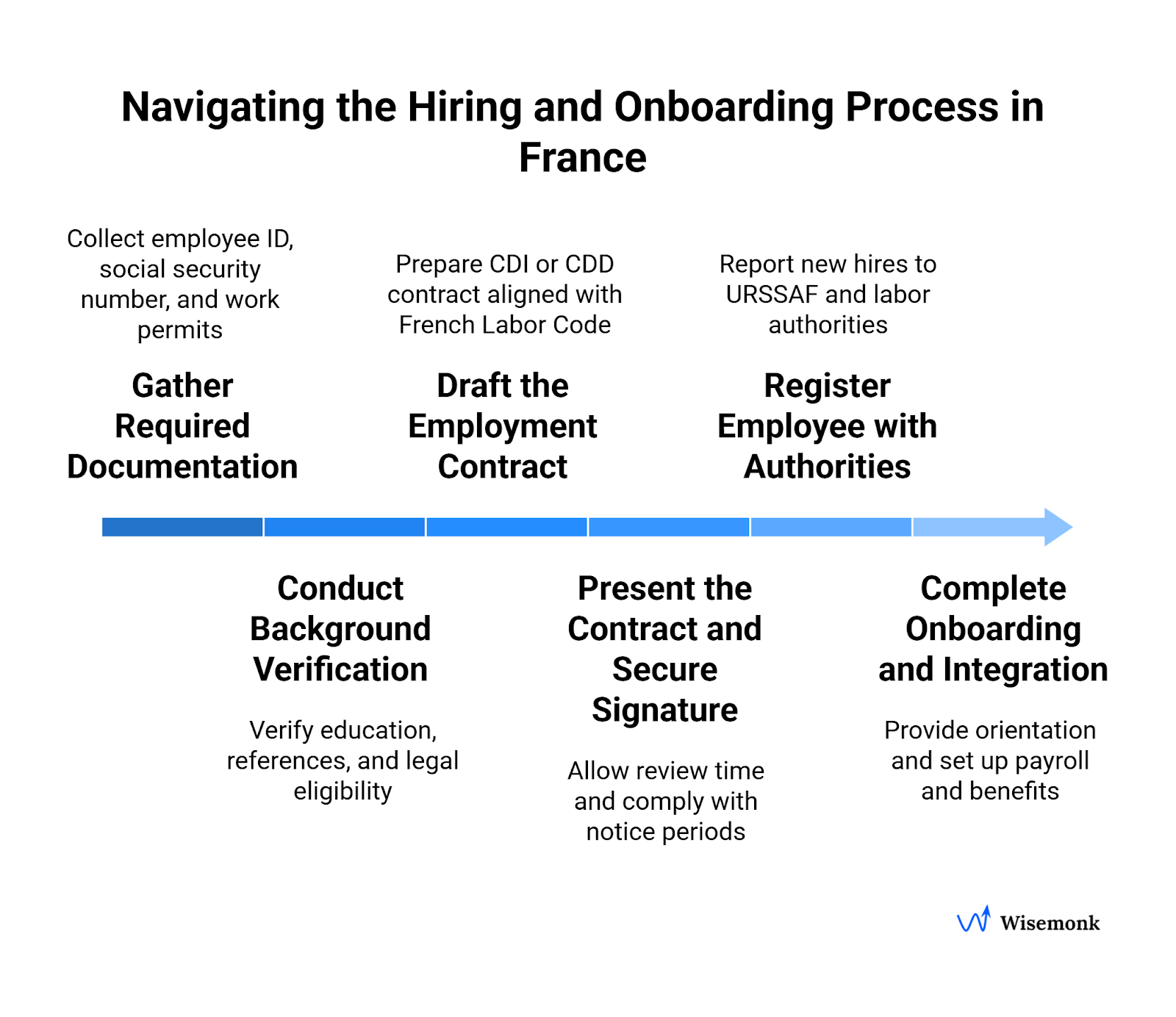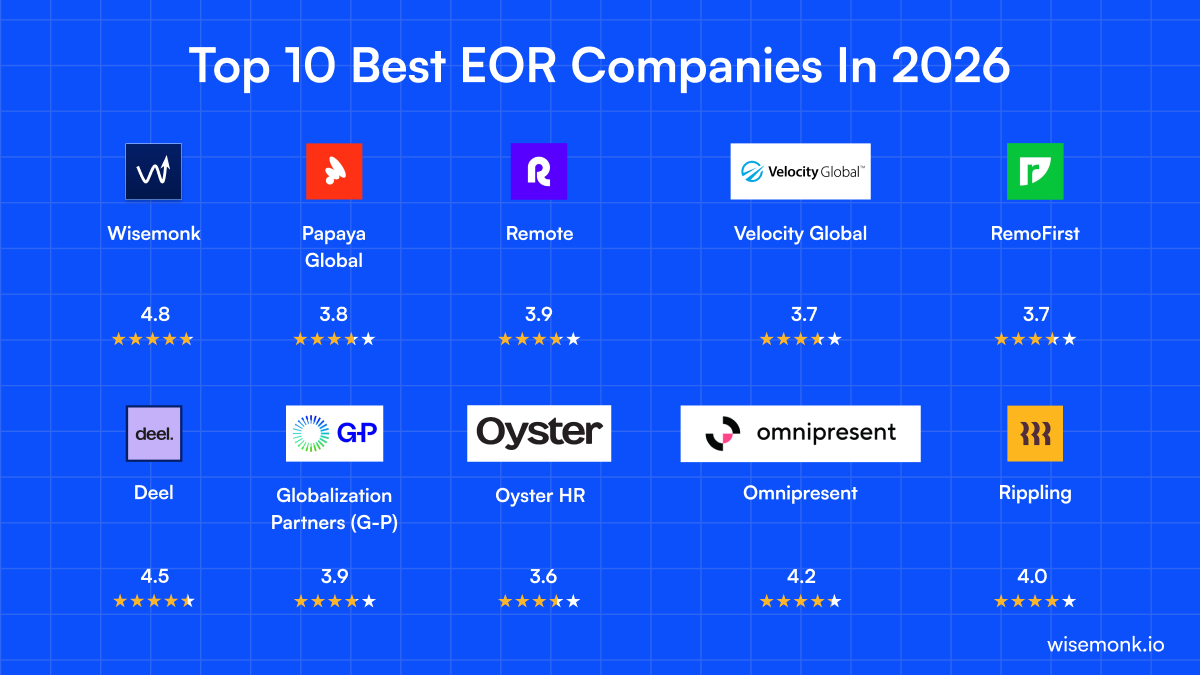Looking to hire top talent in France without setting up a local entity? The Employer of Record (EOR) France solution is the smart, compliant way for global companies to expand into France’s vibrant market, without getting lost in French employment laws and strict labor regulations. In our experience as a leading EOR service provider, the country’s complex labor code, social security contributions, and collective bargaining requirements often trip up even seasoned employers. That’s why having an EOR partner is essential for easy, risk-free hiring in France. Ready to learn how you can scale your French team with confidence and compliance? Let’s dive deeper into the details, starting with the French employment law framework.
What is the French Employment Law Framework?[toc=Employment Law Framework]
Before hiring employees in France, it’s crucial to understand the legal landscape that shapes every employment relationship. In our experience, even experienced international companies are surprised by the level of detail involved in French labor law compliance and employee protections.

French Labor Code (Code du travail)
- The French Labor Code sets the minimum standards for all employment contracts, establishing local employment laws, employee rights, and employer obligations.
- It strictly defines rules around working hours, minimum wage, paid annual leave, notice periods, sick leave, termination procedures, and severance pay.
Collective Bargaining Agreements (CBAs)
- Most employees in France are covered by an applicable collective bargaining agreement, often negotiated by industry or sector.
- These agreements can grant extra employment benefits, set higher minimums for salary payments, define working hours, and add to employer responsibilities beyond statutory benefits.
Works Council and Employee Representation
- Companies with at least 11 employees are legally required to establish a Works Council (Comité Social et Économique, CSE).
- Employee representatives have consultation rights on major decisions affecting working conditions, layoffs, and professional development.
Employee Representation Rights
- Employees benefit from strong legal protections, including rights to organize, elect representatives, and participate in consultations about workplace changes.
- In our experience, French law enforces these rights rigorously, and non-compliance can lead to significant penalties for the legal employer.
Keeping up with the fast-evolving French employment laws and strict labor laws calls for constant vigilance, another reason why many French employers and global companies rely on employer of record France solutions for worry-free compliance.
What are the Key Benefits of France EOR?[toc=Key Benefits of EOR]
If you’re thinking about expanding into France, understanding the value of an employer of record is essential. Many companies underestimate the complexity and risk of French employment laws until they try hiring employees on their own.
- An employer of record in France handles all local employment contracts, payroll taxes, and social security contributions, so your business remains fully compliant with French labor laws, even if you have no local entity.
- EOR services in France take over legal employer responsibilities, simplifying onboarding, statutory benefits administration, and filing payroll taxes while ensuring that both the French labor code and applicable collective bargaining agreements are followed.
- In our experience, this approach not only streamlines the hiring process for international workers but also shields your company from liability tied to strict employment law or unexpected regulatory changes.
- For many global companies, using an EOR is the most reliable way to hire French employees, manage employment benefits, and access skilled talent without setting up a local entity or facing costly legal missteps.
Having guided several organizations through this process, we can say that EOR services France are the safest, fastest route to compliant, effective expansion.
How Does Payroll and Tax Compliance Work in France?[toc=Payroll & Tax Compliance]
Tackling payroll and tax in France can be overwhelming, even for seasoned international employers. From our experience, accurate payroll and strict adherence to tax regulations are absolutely non-negotiable under French law.
- The French tax system requires monthly income tax withholdings, plus mandatory social security contributions covering health insurance, retirement, unemployment, and more, as outlined in the French Labor Code and managed by URSSAF, the local tax authority.
- Employers must file payroll taxes regularly and ensure payments are made on time to avoid penalties. Year-end declarations include annual wage summaries and social contributions for every employee.
- Social security costs are substantial, typically adding 40–45% or more to the employee’s gross salary for the legal employer.
- Many French employers use payroll specialists or partner with an employer of record EOR to stay compliant and optimize tax obligations.
- In our experience, getting payroll and tax compliance right is key to building trust with French employees and avoiding disruptions from labor authorities or unexpected fines.
Hiring in France requires precision with payroll, tax, and benefit calculations, another reason many international companies rely on employer of record France solutions for full compliance.
What Are the Employee Benefits and Entitlements in France?[toc=Employee Benefits & Entitlements]
Understanding employee benefits in France is essential as these entitlements are well regulated and form a key part of labor relations.
- French law mandates a 35-hour work week with paid annual leave of five weeks, plus public holidays.
- Sick leave is paid, with protections that often cover partial or full salary depending on the duration and collective agreements.
- Maternity and paternity leave are more generous than in many countries, with maternity leave typically lasting 16 weeks and paternity leave recently extended to 28 days.
- Many employers provide a 13th-month salary or an equivalent bonus as part of social or collective agreements.
- Social security benefits include health insurance, unemployment support, retirement pensions, and death insurance, funded largely through employer and employee contributions.
- In our experience, these statutory benefits alongside additional perks must be carefully administered to comply with the French labor code and maintain employee satisfaction.
Employers using an EOR in France can ensure all these entitlements are correctly managed, avoiding costly legal risks and aligning with local expectations.
What Is the Hiring and Onboarding Process in France?[toc=Hiring & Onboarding Process]
Hiring employees in France involves several carefully regulated steps. In our experience as a leading Employer of Record service provider, following this process ensures compliance and a smooth onboarding.

- Gather Required Documentation
Collect employee ID, social security number, and valid work permits if hiring international workers. - Conduct Background Verification
Verify education, references, and legal eligibility to work under French labor laws. - Draft the Employment Contract
Prepare the contract clearly stating whether it is a CDI (permanent) or CDD (fixed-term), aligned with the French Labor Code and applicable collective bargaining agreements. - Present the Contract and Secure Signature
Give employees sufficient time to review their contract before signing, to comply with mandatory notice periods and probation terms. - Register Employee with Authorities
Report new hires to URSSAF and local labor authorities within the prescribed timeframe. - Complete Onboarding and Integration
Provide orientation on company policies, workplace safety, and French labor rights, and set up payroll and benefits administration.
Incorporating these steps helps global employers stay compliant with local laws and supports effective workforce integration. Many companies use an employer of record France service to streamline this entire process.
How Should You Manage a French Workforce?[toc=Workforce Management]
Managing employees in France requires understanding the unique French work culture and labor expectations. Adapting management styles improves team engagement and compliance with French labor laws.
- French work culture values formality, clear communication, and respect for work-life balance.
- Managers should encourage open dialogue but maintain professional boundaries in line with local customs.
- Performance management often includes structured reviews and legal considerations around probation periods and disciplinary actions.
- Professional development is supported by legal obligations for employee training and skills improvement.
- Flexible working hours and respecting the 35-hour work week are critical to maintain compliance and employee satisfaction.
Employers using an EOR in France benefit from local expertise in managing these cultural and legal nuances effectively, easing the challenges of running a French workforce remotely.
What Are the Works Council and Employee Representation Requirements in France?[toc=Works Council & Employee Representation]
In France, employee representation is a cornerstone of workplace regulation that many international companies find complex yet essential to understand.
- Works Council (Comité Social et Économique, CSE) Obligation:
By law, companies with 11 or more employees over a consecutive 12-month period must establish a Social and Economic Committee, known as the CSE. This committee represents workers’ interests in areas like working conditions, layoffs, and workplace policies. The requirement to establish a CSE is dictated by the French Labor Code and is enforced universally in the private sector. - Consultation Rights and Protections:
The CSE holds statutory consultation rights and must be involved before significant operational changes, ensuring employees have a voice in company decisions. Employee representatives are entitled to paid time off for their duties (“heures de délégation”) and are protected from dismissal without just cause, a safeguard written into local regulations. - Compliance and Penalties:
Fulfilling these obligations is essential; non-compliance can lead to legal disputes or fines from French labor authorities, which may be substantial. - Practical Insights:
In our experience, foreign companies using an employer of record France service benefit greatly because the EOR typically manages CSE setup, communication, and compliance. This helps global employers avoid pitfalls and build more harmonious labor relations.
For foreign companies using an employer of record France service, the EOR often manages Works Council communication and compliance, simplifying adherence to these strict legal requirements.
What Are the Termination Procedures in France?[toc=Termination Procedures]
Termination in France follows strict laws to protect employees and limit employer risks.
- Types of Dismissal: Dismissals in France fall into personal reasons, such as misconduct or poor performance, or economic reasons like company restructuring. Each type requires following specific legal procedures.
- Notice Period & Severance: Employees must be given a notice period and severance pay, which depend on their contract terms and length of service according to French labor laws.
- Redundancy Process: Economic layoffs require mandatory consultation with the Works Council and the creation of a formal social plan to minimize employee impact.
- Risk Management: Maintaining thorough documentation and strictly adhering to legal requirements helps reduce the risk of disputes or penalties.
In our experience, using an employer of record France service helps navigate these complex rules smoothly and legally.
What Is the Cost Analysis and Financial Planning for Using an Employer of Record in France?[toc=Cost Analysis & Financial Planning]
Understanding costs upfront is vital when expanding into France. Here’s a quick breakdown:
- EOR Pricing Models: Most EORs charge a fixed fee plus a percentage of gross salary, covering payroll, compliance, and benefits administration.
- Social Security Costs: Employers typically pay social security contributions amounting to 40-45% of the gross salary, which must be included in budgeting.
- Benefits Budgeting: Statutory benefits like health insurance, paid leave, and severance must be factored in for accurate financial planning.
- ROI Considerations: Using an EOR avoids the high costs of setting up a local legal entity and reduces legal risks, often providing better value for faster market entry.
Careful cost analysis helps companies decide if an employer of record is the right strategy for their French expansion.
What Are the Common Challenges and Solutions When Employing Through an EOR in France?[toc=Challenges]
Hiring in France through an employer of record does come with challenges, but solutions exist to address each effectively.
- Complex Dismissal Procedures: French termination laws are strict, so working with an EOR ensures adherence to legal steps, minimizing risks.
- Works Council Requirements: Managing employee representation can be confusing; EORs handle compliance and communication with the CSE.
- Cultural Integration: French work culture values formality and balance, so companies need tailored management approaches; EORs provide local expertise.
- Scaling Considerations: Rapid growth requires flexible contracts and compliance; using an EOR allows quick scaling without local entity setup.
In our experience, proactive planning with an experienced EOR partner turns these challenges into manageable aspects of successful French expansion.
Conclusion[toc=Conclusion]
Expanding into France with an employer of record offers a fast, compliant, and cost-effective way to hire without establishing a local entity.
Based on our extensive experience in helping global businesses, EOR solutions help global companies navigate strict French labor laws, manage payroll and employee benefits, and reduce legal risks, all while enabling quick access to skilled talent.
Companies should view EOR services as strategic partners that simplify complex labor and tax regulations, support workforce scaling, and improve operational confidence in the French market.
Ready to act, businesses benefit most by choosing reputable EOR providers with deep local expertise to ensure smooth implementation and ongoing compliance.
Ready to expand your global workforce quickly and compliantly? Partner with Wisemonk’s Employer of Record services to effortlessly manage hiring, payroll, and compliance, so you can focus on growing your business with confidence.
Frequently asked questions
What is the difference between CDI and CDD contracts?
CDI (Contrat à Durée Indéterminée) is a permanent employment contract with no fixed end date, offering strong job security. CDD (Contrat à Durée Déterminée) is a fixed-term contract used for temporary work or specific projects and ends on a set date or event. Both must comply with the French Labor Code and collective agreements.
How does the 35-hour work week affect operations?
The 35-hour work week is the legal standard in France, designed to regulate working hours and promote work-life balance. Employers must adhere to these limits, though overtime is allowed under strict conditions and with additional pay or compensatory time off.
What are the Works Council requirements?
Companies with 11 or more employees must establish a Works Council (CSE) to represent staff interests. The CSE has consultation rights on major workplace decisions and must be involved in layoffs, working conditions changes, and other significant matters.
How are dismissal procedures handled in France?
Dismissals follow strict legal steps based on personal or economic reasons. Employers must provide notice periods, severance pay, and consult employee representatives for redundancies. Proper documentation and fair process are essential to avoid legal disputes.
What are the social security contributions?
Social security contributions are mandatory payments by employers and employees that fund health insurance, retirement, unemployment benefits, and family allowances. Employer contributions typically add 40-45% on top of gross salary, making compliance a key payroll consideration.
How to tell if a company is a PEO?
A PEO (Professional Employer Organization) co-employs your staff, sharing HR, payroll, and compliance responsibilities, while your company manages day-to-day work. Look for co-employment agreements and HR outsourcing services.
Is an EOR worth it?
Yes, an Employer of Record (EOR) is worth it for global or remote hiring. It handles payroll, taxes, compliance, and benefits, allowing businesses to hire internationally without setting up local entities.
.png)
.png)
%20(1).webp)
